Key Notes
-
COVID-19 and the Arizona Talking Book Library & Instructional Resource Center
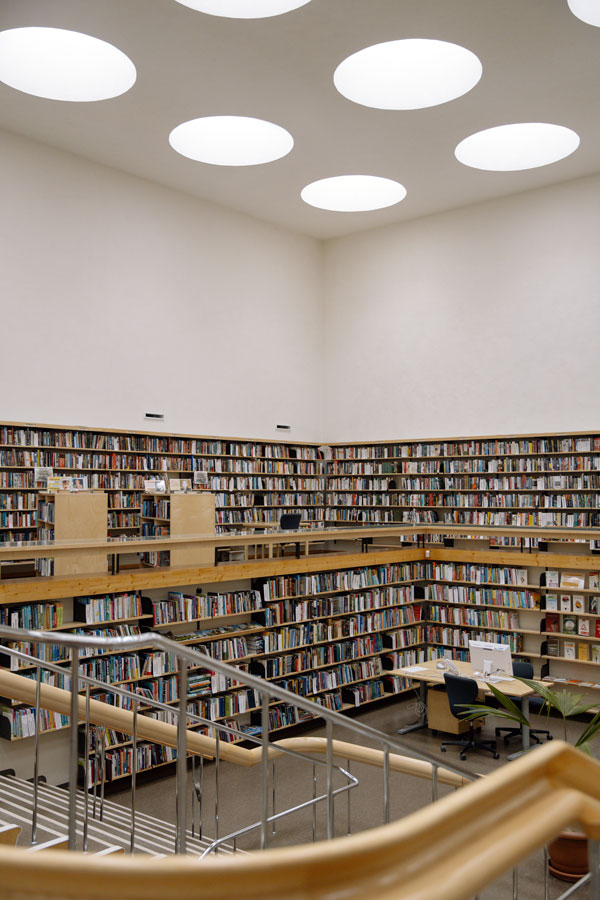
Our KLAS Users' Group officers contacted some KLAS users to ask them to share how their library / organization is faring and what policy, service, or other changes they may have enacted in response to library closure or limited staffing related to Covid19. We welcome submissions from any KLAS user who wants to share their experience during this time. Please contact Chandra Thornton, President, KLAS Users' Group or Drea Callicutt, Keystone Systems if you're interested in contributing a post.
Our next guest post in this series is a collaborative one from Erin Pawlus, Assistant Administrator, Arizona Talking Book Library, and Jared Leslie, Director of Media Services, Foundation for Blind Children.
Our teleworking adventures at the Arizona Talking Book library began on March 23, 2020. At that time, we had about half our staff working on site on an alternating schedule, with the rest working from home. Since then, we have managed to pare it down to about 5 people in the building at a time. Other than the regular trill of phone calls, it has been remarkably quiet. At the time of this writing, we are closed to the public through May 15, 2020, so we encourage our readers to contact us by phone or e-mail.
So, who will you find if you were to tour our library? A supervisor is always on site, as well as someone to forward phone calls. Staff who work from home pick up their voicemail messages and return calls. They are currently using their cell phones and we ask that they block their phone numbers for privacy. If the patron does not accept blocked calls, someone from the office will act as the messenger in those cases and relay information. We are exploring our options for improving phone service while teleworking, but our temporary solution has allowed us to continue serving our patrons during a difficult time.
The Certification Specialist, and staff providing backup, review incoming applications to confirm eligibility a few times a week instead of daily. Since the Reader Advisors are not in the office to receive the applications, basic contact information is entered into KLAS so that the librarians have enough information to call and set up service.
Our volunteers have not yet returned to the library, so book and magazine production in our local recording studio has been put on hold. However, our Studio Manager is back in the booth to narrate Arizona Highways magazine. This is a particularly popular publication for our readers.
The machine agents are available by phone at their home offices to accept requests for equipment and to assist with BARD. Twice a week, the Machine Services Supervisor comes in to prepare mail shipments.
While mail service for books has continued, it has been necessary to decrease the number of materials that we send each day so that we can limit on-site staff and maintain social distancing in the mailroom. We started with a maximum of 650 books a day – a far cry from the 2000 we typically allowed. With a little tinkering we were able to move the needle back to 1000 and have struck a decent balance. We also quarantine books and machines for seven days before they are available for the next patron, which is another important step that has nonetheless slowed down mail processes.
We were soon alerted to an interesting consequence of not serving all patrons needing books every day. While we understood that it may take several more days to ship, patrons were calling in who had not been served in weeks. When we reviewed the issue with Keystone, we discovered that it was because we were giving priority to patrons who were Nightly List Only and being served from specific book requests, leaving the Nightly Autoselect patrons being served by general reading interests to languish and the end of the list. In a normal world, this makes sense – if a patron has specific requests, they should be served before the patron who is happy with what we have in stock. However, this is not a normal world. We switched the order and gradually chipped away at our backlog.
The sudden and unexpected changes to our schedule and workflow have accelerated other projects, however. For example, our agency had provided training on Microsoft Teams starting late last year, but we were not quick to make it a part of our daily routine. Now, we all stay in regular contact through chats and virtual meetings.
Our library has also received the Scribe for duplicating multiple books on a cartridge. We had completed a staff and patron pilot and were starting to introduce it to patrons as they called in with book requests. As our traditional mail service slowed, we offered it to our patrons as a quicker option - we have been able to maintain a next-day turnaround for these orders. While it has been a unique challenge to launch a new service during an uncertain time, many patrons were willing to give it a try. Since early March, we have transitioned over 900 patrons and currently mail out an average of 160 cartridges a day!
We stay in contact with others in our community and partner organizations. Our Instructional Resource Center for Arizona, The Foundation for Blind Children, and the Arizona State School for the Deaf and Blind, continue to request print/braille books that are produced by the National Library Service. Our Youth Services and Engagement Librarian has worked with Teachers of the Visually Impaired (TVIs) to create weekly virtual programs for their students. She also plays with the recently purchased Cricut machine to prepare tactile cut-outs for the upcoming Imagine Your Story Summer Reading Program.
We asked for an update from the Instructional Resource Center for Arizona and they informed us that they began teleworking on March 16, 2020. At a full capacity, they have nine people that are on site supporting thousands of students throughout the state. Most of the team utilizes a desktop computer, so like most organizations they had to secure more laptops to allow for remote access. However, their tech and inventory department was able to secure them the weekend before telecommuting began. Within a day of their tech department receiving the much-needed workstations they were able to get one in the hands of every team member.
Onsite they limited the number of staff to two and had the remaining seven work from home. Each day the staff members on site rotate. This system has allowed for many unintended benefits. They have two main functions: 1.) Producing physical braille and mailing that to districts and customers. 2.) Pulling federal quota items and mailing them out to districts and students. Having rotating team members allowed for cross training for every team member, and those that had specialized roles now were coaching how others could jump in and help.
Everyone has found a way through with trial and error and continue to discover new or different ways to do business. We are not sure what everything will look like in the future, but we have picked up some valuable new skills and a shifting perspective on what is possible... more than we could have imagined. I am encouraged by my staff and our patrons, who have demonstrated amazing grace and resiliency during a high-stress time. Listening to the voices, and sometimes the tears, of our patrons on the line has made it clear to me how truly essential this program is in the lives of the people we serve.
-
COVID-19 and the California Department of Education Press

Our KLAS Users' Group officers contacted some KLAS users to ask them to share how their library / organization is faring and what policy, service, or other changes they may have enacted in response to library closure or limited staffing related to Covid19. We welcome submissions from any KLAS user who wants to share their experience during this time. Please contact Chandra Thornton, President, KLAS Users' Group or Drea Callicutt, Keystone Systems if you're interested in contributing a post.
Our next guest blog post in response to this request is from Jesse Medina, Manager of the California Department of Education Press.
CDE Press has been the publishing unit of the California Department of Education (CDE) for over 50 years. Until last year, CDE Press operated completely out of headquarters, located in Sacramento, California. I have been with CDE Press, in various capacities, for almost 14 years. Ever since I started, CDE Press staff could only fulfill orders on computers at work and customers had to call, email, or even fax their orders in. After years of trying to move our sales online, we finally completed the transition in August 2019. CDE Press was finally able to provide 24 hours a day/7 days a week access to our customers all over the world. It ended up being perfect timing for what would happen in 2020.
When the direction from the CDE Executive Office to try and telecommute as much as possible in March, CDE Press would be equipped to handle the needs of customers while also allowing staff to work from home. It took a few days for staff to get used to (me included) but I am thankful that we were in position to be able handle this transition as smoothly as we did. A lot of credit goes to my staff, who were willing to take on different tasks, be available at odd hours, and work with our customers to accommodate their needs and situations as best as we can.
On a personal note, I have been appreciative of this time that I get to work from home. My wife has been working from home for several years so she was used to it. I get to spend more time with her and our three dogs. They love to go back and forth between the office and where I work to supervise us. Sometimes they even show up, both visually and audibly, in my virtual meetings. We also live close to both of our parents and have been able to share those resources that have been in short supply these past few months. We try our best to support our local restaurants and businesses as we know they are having a tough time with the restrictions.
With my staff, my family, and work, I am very thankful and consider myself very lucky! I hope you all stay safe and healthy!
Jesse Medina, CDE Press Manager
-
COVID-19 and the Florida Braille and Talking Book Libraries
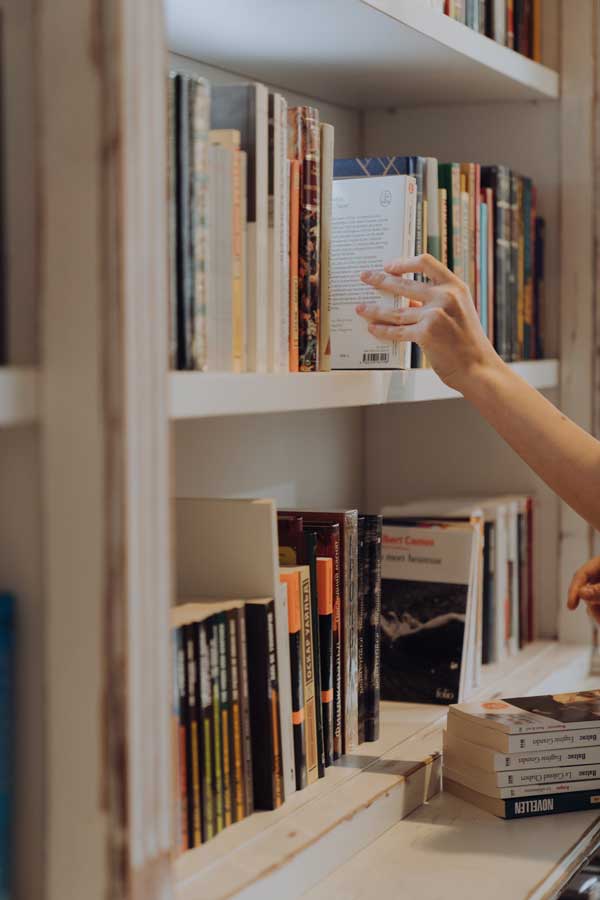
Our next guest blog post in response to this request is from Maureen Dorosinski and the various regional librarians of Florida.
FL1A
The Library is part of the Division of Blind Services, which is under the Florida Department of Education. First the school closings came, then the stay at home order. We were told to telework as much as possible. We were an 'essential service'. Our circulation and production staff core duties are not able to be performed remotely, while reader advisor services and other responsibilities could be performed remotely. Others applied for telework, trying to find a way to be out of the library around people, but without enough leave to cover the duration of the stay at home order. We have vulnerable category staff. Additionally, our OPS part time staff in circulation, had decided to simply take unpaid leave. This left circulation extremely short handed. About half staff, when we were already two positions short. The outlook is bleak and morale is low because now there is a hiring freeze and one position is on hold. One production staff member worked in both areas simultaneously.
Then, COVID came to the library. We were told "someone in the building tested positive", and were given the last date they were in the library, the details were not clear but then, the staff just cleared out. We are behind and had been shifting quarantine back, and also, had been operating day to day as to who was in and able to do what.
All we can do now is wait until April 30 and see if there are any changes. Staff have contacted me frantic and desperate to get more information...and I have none to offer. I wonder myself what if someone tests positive in this time. Do I trust these results will be disclosed? What do I do for myself, and my family, if I have vulnerable people in my life?
After I wrote this, I opened it up this morning, Friday, April 24. Some else on campus has tested positive, and now we are out until May 7. That above scenario was again repeated when we were told we needed to close because someone else tested positive on campus, rehab center staff, and then we adjusted the reopening times twice. Luckily KLAS staff as well as subregional staff were able to help button up the day, and redistribute service throughout the rest of the open libraries. A good deal of patrons will be able to be served with the FL network pulling together!
Rereading my notes, everyone is even more confused, and my morning was consumed with getting information and timesheets and testing sites, and creating telework tasks for those who do not have any sort of technology at home, nor a job that has a real remote counterpart and looked up and breathed and just hoped everyone turns out okay.
On service to patrons: Kim Peters at FL1D had a great idea, to ask for a report of patrons who have met their limit so she could go into their accounts and raise their limits right away. John Owen pulled together such a report, and she was able to raise many patrons so service would continue. He then did a similar thing for FL1A, and we are applying it as well. Thousands of patrons will now have service continue uninterrupted, while their returns wait at the post office, or on our loading dock in quarantine, until we get back into the office. For patrons that had reached their NSCutOff after January 1, 2020, we would raise their limit by 10 books. This would target those patrons most likely to benefit from the increase, those that are most active. Patrons not at their NSCutOff yet are being served by open libraries now and books received after April 22nd will be from those branches. Once the books are returned and checked in these patrons will be eligible for more service.
All of the SRLS who are open, are to be commended for their willingness to help by raising their card run limits in order to serve Florida. We are so grateful for their dedication and extra work during this time:
- FL1G, Sarah Smedley and her team in Palm Beach County
- FL1H, Bill Forbes and his team in Broward County
- FL1K, Debra Martin and her team in Brevard County
- FL1M, Megan Magee and her team in Pinellas County
- FL1L, Greg Jackson and his team in Escambia County, West Florida Public Library
The same gratitude goes to the entire KLAS team as well, especially John Owen and Nancy Honeycutt.
-Maureen Dorosinski, FL1A Librarian
FL1C
Meeting patrons needs by mail during Coronavirus
Due to the high rate of COVID-19 cases in Miami-Dade County, the Miami-Dade Public Library System closed to the public on March 18, 2020. On Thursday March 19th my supervisor contacted me about the possibility of using our Borrow-by-Mail service to send out the backlog of holds that customers were unable to pick up due to branch closures. Borrow-by-Mail is a fee based service that allows patrons to place requests from our catalog and have them mailed to their home address for a $4.00 fee. It was decided that we would waive the fee and start asking branches in groups of 3-4 to call the patrons, ask if they want their holds shipped and ship the books to our Books-by-Mail and Borrow-by-Mail Departments called Connections. Connections is located at the North Dade Regional Library right next to our Talking Books Department. I supervise both departments.
We manage Borrow-by-Mail using Polaris and a Neopost machine. It is a slow process but we can incorporate tracking numbers which are listed in the patrons record. It is also nice because Polaris generates mailing labels and a letter with instructions. It was decided we would eliminate tracking numbers to speed up the process since we were not charging for the service at this time. We processed about 140 items over three afternoons before we were sent home on March 24th. After we were sent home, a team of employees were asked to report to the Main Library and branch staff were asked to check out the holds that patrons wanted and send them to Main to be mailed out. They decided to bypass the Borrow-by-Mail function to expedite the processing. Hundreds of holds were sent out by the staff working at the Main Library.
While that was happening, one of my staff from Connections, one from Talking Books and myself were set up with a laptop with remote access to our desktop so we could start placing requests for patrons. We discovered KLAS and Polaris worked surprisingly well this way. The first day I was able to access KLAS, I began having the Talking Books phones forwarded to my personal cell and I received over 30 calls. Many of the patrons were extremely concerned about the well-being of the staff. They were also tremendously grateful that we were taking requests and that other libraries around the state would be shipping items out.
Unfortunately, I began receiving calls and emails that some of our patrons had not received the Borrow-by-Mail holds they had been expecting. As it turned out, a large shipment was sent to Connections shortly before we were sent home and arrived after we had closed up. Doris, my Connections Manager and I ventured back into North Dade Regional and shipped 178 items to 76 customers in 7 hours. Then, I started receiving calls from Talking Books customers stating they weren't receiving their cartridges. Well as it turns out, some of the Talking Books has been assigned to FL1C by mistake. Maureen Dorosinski from Daytona and John Owen from KLAS ran a report for me and we were able to assign the items to an open library.
On Friday April 17th, Post Office informed us that they had to start delivering our mail at North Dade Regional again due to the large quantity of items. Twenty crates of cartridges were delivered on Friday morning and two more shipments were on the way. Four of my staff (3 pages and one librarian) and myself plan to report to North Dade Regional on Monday April 20th to get a handle on the backlog. More to come....
-Jennifer Shipley, Library Operations Manager
Miami-Dade Public Library SystemFL1D
The list John prepared for me is excellent as it identifies all those already maxed out. I've already increased NS cutoff for about 70+ patrons and have about 200 more to go. Most are folks who only get a couple of books a week and had low cutoffs of 12 books. I am catching it in time as most got their last delivery last week.
I've been so worried about my patrons having books and this is a blessing!
-Kim Peters
FL1M
Our policy changes have been: no one except staff in building (including volunteers we have had to pick up their work), stay 6 ft apart, Wednesdays off except printing and mailing the run, we also had to suspend our cleaning service and have been assigned many cleaning duties to keep the building running.
Our stats have changed because we no longer are having people "walk-in" as patrons, but our phone number and email count have been through the roof. Way higher than normal. The staff have been slammed with so many patrons asking for 10, 20 books at a time because they are locked in their rooms in nursing home facilities and it is the only thing they have to do. Staff have been doing their best to keep up with the new high demands, but they are definitely feeling a strain and are having to push through the weariness. One of our staff has been out for 10 days because she had a fever. She was tested for Covid-19 and the test results came back today, four days after her test as negative.
Personally, it has been a strange transition with new information and policies changing daily. It is mentally taxing, and there is so much work to be done. I am sad to say there are even times I have felt unsafe at work simply by having to leave my house and see coworkers from a distance in the building due to what the media and CDC have deemed as safe. It is tiresome because I live with one other person who has been working from home since March 12th. I am the only person in my household who interacts with other people. I will be fully responsible if I get my household sick. This is a scary weight I have been carrying everyday I come to work. I had to decide what was worth it to me. I decided my job was a worthy cause worth doing and that as long as we were expected to show up, I would. I know every person who is working during this time is probably going through something similar.
One silver-lining has been the patrons are more grateful than ever. They claim we are saving their lives by providing something to do while they are stuck in their nursing home rooms with no one and nothing to do. Hearing them be grateful has been the best part of this whole experience.
Thanks!
-Meagan Magee
Talking Book Library Services Coordinator
Pinellas Public Library CooperativeGood morning. Emails and phone messages sent on Wednesday are answered on Thursday due to limited Wednesday service. We have 3 office staff currently pulling now, so we are fine! We are more than happy to help out. A mail card limit of 1500 a day is fine. 1200 yesterday and 606 today.
Phone is off the hook nowadays and I do about 20 patron ILLS a day now and there are 3 of us!
We are staying afloat. God Bless you guys in Daytona!
-Juliet Relyea
Public Services Specialist
Pinellas Talking Book LibraryFL1K
We are still operating as usual. Our volunteers are not allowed to come in.
FL1L
With the exception of a dip immediately following the WHO's pandemic declaration, circulation has risen on a year-to-year comparison by week.
Stay well, everyone!
-Chris Hare
Senior Librarian
West Florida Public Libraries -
COVID-19 and the New Mexico Library for the Blind & Print Disabled
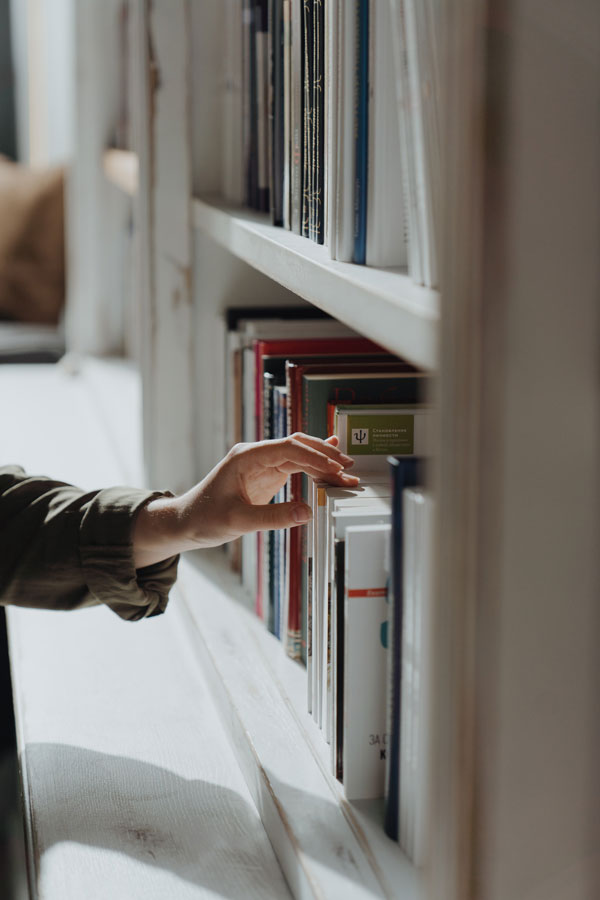
Our KLAS Users' Group officers contacted some KLAS users to ask them to share how their library / organization is faring and what policy, service, or other changes they may have enacted in response to library closure or limited staffing related to Covid19. We welcome submissions from any KLAS user who wants to share their experience during this time. Please contact Chandra Thornton, President, KLAS Users' Group or Drea Callicutt, Keystone Systems if you're interested in contributing a post.
Our next guest blog post in response to this request is from Sam Lundberg, Reader Advisor, New Mexico State Library, Library for the Blind & Print Disabled.
COVID-19 and the New Mexico Library for the Blind & Print Disabled
In large part because of our small size and flexible staff, the New Mexico LBPD has been able to stay open and continue service to all ~2,600 of our patrons. Of our 7 staff members, 5 are working from home and 2 are coming into the office daily, but never at the same time. One staffer handles all of our physical delivery, along with outgoing and incoming mail each morning. Meanwhile, the other staffer handles all DoD and equipment orders each afternoon. All of our RA work is done remotely, with our phones going directly to voicemail which we check repeatedly over the course of the day.
With New Mexico closing down hard and fast, we were able to see the shutdown coming and prepare as best we could. One of the biggest things we did was send out our newsletter early. We had a mostly complete draft ready, which we edited to include our COVID plans on the front page and rushed to get sent out. This, along with our voicemail recording, alerted each patron to the two basic facts that 1) we are still open, and 2) things will be delayed a bit. We had a minor panic attack when all staff were ordered to stay out of the State Library building on Friday of the first week, but we were quickly able to be designated as essential and limited staff allowed to return to the building on Monday.
One adjustment we made to accommodate our new staff schedule, with the help of Keystone, was to reschedule some of our nightly functions related to DoD so that they run mid-afternoon. This allows us to check in DoD cartridges and then have new orders created for those patrons the same day, preventing us from adding on an additional day of delay beyond the 4 days we are already quarantining all incoming mail.
Our patrons have generally been very understanding. We have several patrons who normally insist on a callback, or will call repeatedly until they catch a live RA, instead leave a voicemail with their order. I know I really appreciated this because those first couple weeks were rather frantic with patrons trying to order as many books as possible as nursing homes and other facilities across the state went into lockdown. We are right in the middle of our year-long DoD transition, and this provided great motivation to move many more patrons to DoD service. While we have not increased the cutoff values for our patrons across the board, we’re regularly manually assigning books well above our usual limits.
We are still calling back patrons when necessary, especially for BARD support and other more detailed problems. To avoid patrons being able to gather staff personal phone numbers, our RA responsible for the majority of callbacks set up a Google Voice temporary phone number, which she can set to “Do Not Disturb” during non-work hours. This has been an effective, if ad-hoc, solution.
This whole circumstance has offered up opportunities to tackle a few large projects that we’ve had on the back burner. Series sequence cataloging, flushing out our local subjects, and contacting inactive patrons, to name a few. We’ve also gotten involved in the Rating Unrated Books project, which is a nice change of pace when you need it.
I think we are in a stable place as a library and should be able to continue service at our current level for an extended time, although not at the highest level of service we’ve pushed hard for recently. There is outreach we’ve had to scrap and, while review of local narration projects continues, current narrations are on hold. Even though we cannot speak with every patron, we are still getting books out. Our staff will keep going like this as long as we need to, with the continued resilience and creativity necessary during these extraordinary times.
-
COVID-19 and the State Library of Kansas, Talking Books Service
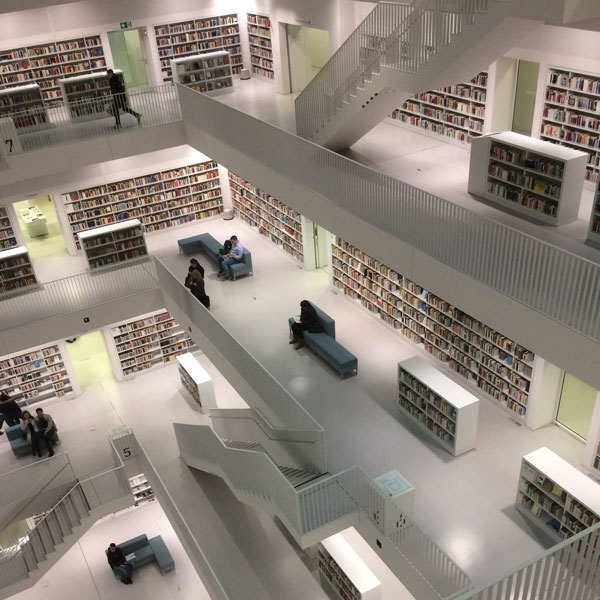
Our KLAS Users' Group officers contacted some KLAS users to ask them to share how their library / organization is faring and what policy, service, or other changes they may have enacted in response to library closure or limited staffing related to Covid19. We welcome submissions from any KLAS user who wants to share their experience during this time. Please contact Chandra Thornton, President, KLAS Users' Group or Drea Callicutt, Keystone Systems if you're interested in contributing a post.
Our next guest blog post in response to this request is from Michael Lang, Director, State Library of Kansas, Talking Books Service.
March 16 – March 20: The Scramble
Kansas Talking Books began quarantining incoming items on Monday, March 16th. Our initial procedure was to disinfect all incoming items, scan them into a quarantine shelf, while wearing gloves, and let them sit for seven days. We did this for one week.
On Tuesday, March 17th at 4:00 p.m., Kansas Governor Laura Kelly held a press conference announcing the two week closure of all state offices beginning Saturday the 21st.
We emailed all of our residential facilities and individuals to alert them to our closure and encourage them to order more books and/or sign up for BARD. We identified heavy users and assigned them more books. We encouraged any patrons who called to order extra items. We discussed increasing out nightly cutoff for all patrons but weren’t sure we could get that many books pulled. For the next three days, we pulled twice our daily average. On Friday afternoon, Keystone ran a second round of nightly autoselect, and we did a full second pull.
Regrettably, this left patrons without email addresses and who didn’t call in underserved during, what would become, a four-week period with no outgoing items. Many of our patrons also don’t realize we are part of a state agency and might not have realized the governor’s order to close applied to us. This news was also overshadowed in the same press conference that she announced the closing of all school buildings for the rest of the school year.
March 21- April 5: The Shutdown
For the following two weeks, staff went home with instructions not to work. Our voicemail message started that we would reopen on the 6th. Our mail was delivered as usual to Emporia State University, where we are located, and held in the mailroom separated by date received. During this time, Emporia State University closed all buildings to the public.
I monitored emails and signed patrons up for BARD when possible.
April 6 – April 19: The Reset
State employees were instructed to return to work on April 6th, remotely if possible or on site if not possible but deemed safe, to provide missions essential functions. I returned to work with a skeleton crew of rotating circulation staff. Circulation staff checked in the books and equipment that we received during our two week closure.
RA staff began working from home, accessing their voicemails and returning call from their cells phones using blocked numbers. Eventually, we were able to get 3 of the 4 remote staff’s VOIP office phones hooked up in their homes. They are able to receive and return calls from their office numbers. The fourth person has a work issued cell phone so that she no longer has to call from a blocked/unknown number. RA staff continued to assign and reserve books for patrons during this time. They also encouraged patrons to try to use BARD as uncertainty in our operational status remained.
Additionally, with all campus buildings locked down, the postal service is not delivering to campus. ESU staff pick up the mail on Monday and Thursday. We were informed on April 13th that they would no longer be picking up our books and equipment but will still pick up our paper mail on Mondays and Thursdays. I must go to the post office to pick up our items.
April 20 – Present: Doing the Best that We Can
On April 20th, we began mailing out books and machines. In those first two days, circulation staff prepped and pulled almost 5,000 items and I delivered 56 bags of mail to the post office using my mother-in-law’s Ford Ranger. I am now delivering and picking up mail at the post office daily. We are allowing returned books and machines to sit untouched for at a minimum of four full days in our library before being handled by staff. Monday’s mail is sorted on Friday, Tuesday-Thursday on Monday and Friday’s mail gets sorted on Tuesday. It’s really messing with our daily procedures but we’re making it work.
The State Library has a contract with Splashtop, which provides remote access to desktop computers. During the week of April 20th we were able to get remote staff set up so that they can work on their desktop computers remotely from home. This allows them to access our network drives, networked printers, and some of our audio editing software. RA staff are also prepping for summer reading, cataloging, and editing audio as time allows. They will be working remotely until at least June 1.
-
COVID-19 and the Washington Talking Book & Braille Library
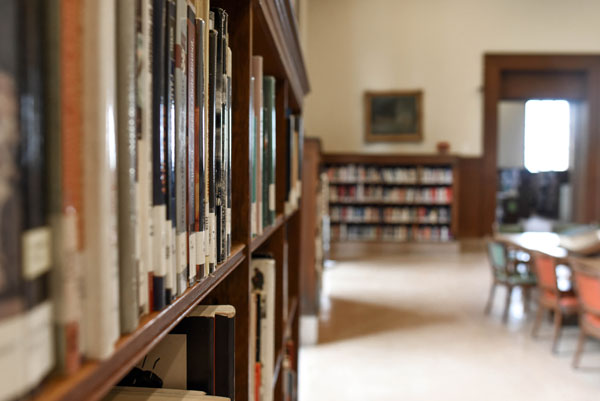
Our KLAS Users' Group officers contacted some KLAS users to ask them to share how their library / organization is faring and what policy, service, or other changes they may have enacted in response to library closure or limited staffing related to Covid19. We welcome submissions from any KLAS user who wants to share their experience during this time. Please contact Chandra Thornton, President, KLAS Users' Group or Drea Callicutt, Keystone Systems if you're interested in contributing a post.
Our first guest blog post in response to this request is from Danielle Miller, Director & Regional Librarian, Washington Talking Book & Braille Library.
COVID-19 and the Washington Talking Book & Braille Library
Gues
We are all experiencing a crisis most of didn’t imagine we would be in, and might not have felt adequately prepared to manage. These are unprecedented times and our libraries are vital resources for our patrons, yet many of us are finding we are having to stop, decrease, or modify services to our patrons in response to the pandemic. Washington State was the initial U.S. coronavirus epicenter. Home to the first case of coronavirus, and the first death on February 29th was in King County, where the Washington Talking Book & Braille Library (WTBBL) is located. On March 2nd there were 14 more cases, 6 more deaths, and schools began closing. In response to the growing concerns about patron, volunteer, and staff safety, that same day we implemented new procedures in handling our mail. All books, including DBs, braille, LP, and any new items, were checked in or processed using gloves. Incoming materials were then set aside and marked with the date and were quarantined (not put into circulation or inspection) for eight days. PCC or our proto Duplication on Demand patron cartridges were checked in like others, using gloves, and then the cartridges were disinfected and received new (previously unused, or not used for a period longer than 8 days) mailing containers. Machines were disinfected and also dated and set aside for a period of eight days before going back into circulation.On March 3rd we sent a message to our volunteers about all the safety measures we were implementing at WTBBL and letting them know they only needed to come if they felt comfortable doing so. We were open and operating as normal, but adding precautions for everyone’s safety. Our maintenance custodian was disinfecting all door handles, tables, water fountains, and frequently touched surfaces at least three times a day. The surfaces and chairs in the audio recording booths were being disinfected throughout the day. We added Kleenex and hand sanitizer in multiple locations throughout the building, as well as adding hand sanitizer and disinfecting wipes in the audio booths. We also put up notices in the building and at the volunteer sign-in station describing the precautions we were taking. We did see a decline in the number of volunteers coming to the library, but many still came, especially volunteer narrators and reviewers.
By March 15th, there were 772 confirmed cases and our Governor announced that all entertainment and recreational facilities, including bars and restaurants, were to close. The next day, WTBBL closed to the public and all volunteers. All staff continued to come to work and perform their regular duties and we continued circulation of materials as usual while following the safety measures previously outlined. On March 17th, the number of cases had jumped to 1,009 and we were anticipating that the Governor would soon issue a stay-at-home order. Worrying we would could be sent home at any time and not be able to send out materials, we decided to do a surge in our circulation to push our extra books to our patrons.
For all patrons with cutoffs between 4-16 books, we increased them all by four books. Our average daily circulation is between 1,200-1,500 items and we raised our daily circulation cutoff from 2,500 to 4,000. So on March 19, 20, 23, and 24, we did circs of over 4,000 digital books. More than we have ever done! This push got four additional books, over 16,000 cartridges to almost 4,000 patrons. We had started our push to get extra books out just in time, as on March 23rd, Governor Inslee announced a “stay home, stay healthy,” order effective March 25th, and currently in effect until May 5th but may yet be extended.
Beginning March 25th, all staff started working remotely. We are checking our voicemail remotely, encouraging people to sign up for BARD if that is an option for them, checking and answering our WTBBL email, approving BARD applications and providing BARD support by email, and posting to our social media. Some staff are also working on various cataloging projects, our Audio Book Production Department staff are working on editing and review as they can, and we have some transcription work for our Braille Department in progress.
For many staff, they are working on taking trainings and staying current on email. For the most part we have not been able to access the building, but as of April 15th, we were able to resume the delivery of our returned book mail and our First Class mail. On our first day we received 20 hampers of books. We will be receiving our mail delivery daily and I will be going in three days a week to process First Class mail. Unfortunately, we are unable to send out any books at this time. We are all hopeful we can begin to return to work and start circulating books again on May 5th. The digital divide experienced by so many of our users, and the many, many voicemails begging for books we can’t send demonstrate what an essential service our patrons believe we are. As soon as we are given the all clear, we’ll be ready to be all hands on deck to get through all our returned materials and start sending out books again, so that all may read.
-
COVID-19 KeyNotes Blog Posts to Date

COVID-19 has thoroughly upended almost all of our "typical" workdays, routines, and daily lives. It's affected each of us in very different, but very substantial ways. This Spring brought changes to how Keystone and many of our libraries operated. We've seen shifts in patron service models, circulation policies, and staffing scheduling and environments. In the last month, some agencies began to open back up and deal with the repercussions of limited staff, quarantining materials, backlogged items waiting to check-in, etc. while others may be facing another shift as state reevaluate their plans to reopen with the newest surge of cases. No matter where your organization or staff are in this process, we're doing our best to continue supporting you. Yet, we also know we aren't the ones dealing with the day-to-day, and only others in similar circumstances can relate and offer the best advice for you at this time. Therefore, today I am taking some time to again share relevant COVID-19 related KeysNotes blog posts from our staff as well from other KLAS Users.
The posts are in order from oldest to most recent.
Keystone Authored KeyNotes COVID-19 Related Posts:
- Important Coronavirus Info
- Working Remotely Tips & Tricks
- Working Remotely Tips & Tricks Part II
- A Note from James, plus Tips & Tricks Part III
- Tips & Tricks - Back to the Stacks
Yet, we also know we aren't the ones dealing with the day-to-day, and only others in similar circumstances can relate and offer the best advice for you at this time. Therefore, here are the words of your colleagues written in response to our request for input about what policy and procedural changes they've made in response to this unprecedented shift in how we all function.
KLAS Users Authored KeyNotes COVID-19 Related Posts:
- COVID-19 and the Washington Talking Book & Braille Library
- COVID-19 and the Florida Braille and Talking Book Libraries
- COVID-19 and New Mexico State Library, Library for the Blind & Print Disabled
- COVID-19 and the California Department of Education Press
- COVID-19 and State Library of Kansas, Talking Books Service
- COVID-19 and TN RCVI
- COVID-19 and the Arizona Talking Book Library & Instructional Resource Center
- COVID-19 and NC LBPH
-
Bonus Post
In March, Keystone staff shared something a bit more lighthearted and published some of their favorite recipes to cook in their home kitchens while self-isolating. You can check them out in this post: Keystone Quarantine Kitchen
-
COVID-19 Updates

Previously, we've shared a number of guest blog posts on how COVID-19 is affecting KLAS libraries and resource centers. Since then, there has been plenty of re-opening, re-closing, and re-evaluating as each state and all of their associated agencies work to find the best course of action.
We recently reached out to our original guest bloggers for an update on their situation. Read on to see how things have progressed in Washington, New Mexico, and Kansas.
And if you would like to share how your library / organization is faring, and what policy, service, or other changes you have enacted in response to Covid19, we still welcome submissions from any KLAS user. Please contact Chandra Thornton, Past President, KLAS Users' Group or Drea Callicutt, Keystone Systems if you're interested in contributing a post.
Sam Lundberg, New Mexico State Library for the Blind & Print Disabled
I said in my original post that New Mexico would be able to hold at current levels, and that's basically what we've done. Books are going out and coming in, processed by two staff members who are never in the building at the same time. We're also answering the phone live thanks to call forwarding and Google Voice, providing full RA service from home. Small, random things like sending out a paper application are more difficult than they were before, but we're in a sustainable place.
The only real change we've had is that we're finally wrapping up our conversion to DoD. After 9+ months of slowly transitioning patrons one conversation at a time, we're finally bulk converting our remaining patrons. It is very exciting to finally be going fully to Scribe for book delivery, although the fate of our carousel system is now very much an open question.
(Read the original New Mexico post)
Danielle Miller, Washington Talking Book & Braille Library
On June 2nd, our Governor approved a waiver request for the Washington Talking Book & Braille Library to begin circulating books and materials during Phase 1 of our “Safe Start” plan. On June 4th, we resumed circulation with four staff returning to work to join the director. We had over 40 mail bins of returned books and equipment that still needed to be checked in and thousands of patrons waiting for books. Working as a team, everything was checked in and everyone was served in record time. Circulation was operating normally, with all staff wearing PPE and following safety protocols. The director was still checking voicemail daily and responding to patrons, and most staff were still working remotely.
When our county moved into Phase 2, on June 29th, more staff were able to return to the library. We were able to start answering the phones and resume regular readers’ advisory. Some staff continue to work from home and the library is still closed to the public and to volunteers. We are busy answering phones, circulating books, continuing work in our Audio and Braille Departments, and all staff at the library are helping with book inspection daily. We are looking forward to the time we can have all of our staff together and slowly bring our volunteers back. Ensuring everyone’s safety is the highest priority, and we want to do what we can to avoid another disruption in circulation.
(Read the original Washington post)
Michael Lang, State Library of Kansas, Talking Books Service
Present: Still Doing the Best that We Can
We are still working with the model we implemented in April.
The circulation staff and I are working on site. We are allowing returned books and machines to sit untouched for a minimum of three full days in our library before handled by staff. The good news is that mail is again being delivered and picked up at our building by the USPS. No more daily runs to the post office in my mother-in-law’s truck.
RA staff are still working remotely; answering phone calls, emails, updating catalog records, editing audio, creating book lists, and looking for online continuing education opportunities. Our VOIP phones and splashtop connections are saving us from the early frustrations we were having. If there is something they need to do onsite, they can schedule a time with me to come in to work. They will return onsite fulltime when the following criteria have been met:
- The ESU Memorial Union is open
- Lyon County enters the phase out stage of Gov. Kelly’s Ad Astra recovery plan
- The State of Kansas enters the phase out stage of Gov. Kelly’s Ad Astra recovery plan
Our volunteer recording program is on hold until further notice. Circulation staff are recording our local magazines to keep them as current as possible.
Cases are currently trending upward in Kansas. On July 15, Kansas Governor Laura Kelly announced that public schools will not reopen until after Labor Day.
Emporia State University buildings are scheduled to reopen to the public on August 3rd, masks will be required for everyone on campus. Students will return beginning August 12th. They’ve shut off the water fountains in our building.
I feel like we’re managing to serve our patrons pretty well. The turnaround time is a little slower for books, but increasing cutoff limits for underserved patrons keeps most people in books. Most patrons have been very understanding. I think our biggest loss will be outreach. All outreach events for the year are cancelled. Trying to find new avenues to reach prospective patrons is difficult. If you’ve got any advice, we’d love the help.
(Read the original Kansas post)
-
Creating a Custom, Accessible Bibliography
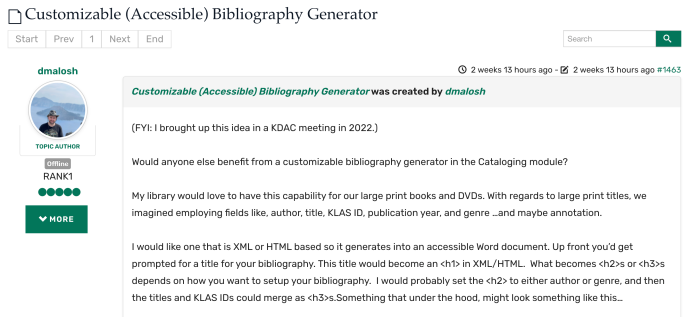
A Customizable (Accessible) Bibliography Generator, that was Dan Malosh of MN's request on the Forums about two weeks ago:

Would anyone else benefit from a customizable bibliography generator in the Cataloging module?
My library would love to have this capability for our large print books and DVDs. With regards to large print titles, we imagined employing fields like, author, title, KLAS ID, publication year, and genre …and maybe annotation.
This sparked a lot of interest... and then Sam Lundberg of NM chimed in to let us know about his rather ingenious method for doing just this, using KLAS's standard Export to Excel function and Word's Mail Merge.
The best part (at least in my opinion): once you have your Word template set up, you can simply select the exported Excel document from any catalog query or book search results to get a booklist that is nicely formatted to your exact specifications! The only thing this can't do automatically is generate the BARD link, though someone familiar enough with manipulating Excel data can add that prior to importing the data into Word, provided they do it the same way every time.
Learn how to create your booklists by following Sam's instructions, and give it a try with his example template and export:
- Mail Merge Booklist Instructions
- Example Booklist Template (on opening, you will be prompted to select your data source, which should be the Excel file below)
- Example KLAS Export
I don't know about you, but I'm imagining the possibilities already. If you build a template of your own for any KLAS export, I hope you'll share it with the Users' Group here!
-
Customized Browse Tables
You probably know that you can move and sort columns in basically any browse table in KLAS; however, did you know that it is also possible to add or remove columns as well?
When you export a browse table, you have the option of exporting either Visible or All Fields. As that suggests, each browse table includes many columns that are usually hidden. KLAS Customer Support can adjust your library’s configuration, hiding or revealing these columns. While simply moving columns is sufficient for most situations, it affects only the specific user that made the change. A customized browse, on the other hand, affects all users at that branch.
If there are columns that are never needed by your library, you could save the time and confusion of having every reader advisor move them to the far end of the table. For example, columns for the “local branch,” “main branch,” and “all branches” are useful for multi-branch systems, but single-branch systems only need one of the three.
Even better than removing columns is the option to add columns. If there is a column in the “export all fields” results which you would like to be included in the table (for all users at your branch), Customer Support can make it visible. A few columns that libraries have requested are:
Email Address in Patron Find
If you send your newsletter by email or want to alert all patrons in a certain city to an event, you can make exporting the email list faster and easier by including patrons’ Email contact in the Patron Find.
Title Status in Book Search
If your Reader Advisors want quicker access to whether a book is Active, In-Process, or BARD Only, the Title Status column can be added to the Book Search Results.
Have you noticed any columns in the “export all fields” results that your library would like to see in the visible fields? Have any visible columns been confusing your staff, and ought to be tucked away? Contact Ks7 to request a customized browse table—make sure to specify which browse you are working with, the column you need, and where you would like its default location to be. A screen cap is always helpful!
And if a customized browse table is too much commitment (or hasn’t been approved by your supervisor), brush up on how to move and sort columns to make the best of what’s already there.
-
Disaster Preparedness & Recovery Update

As thunder sounds over the Keystone offices and we enter peak hurricane season, it seems like a good time to revisit our Disaster Preparedness and Recovery procedures.
We’ve posted about this before, and the 2018 Post is still applicable, so feel free to have a look back at that one. But technology is ever-evolving, and we’ve been keeping up. Here’s an overview of some changes:
7.7 Procedures
The back-end changes in KLAS version 7.7 mean that creating and restoring backups is a different process from 7.6. As 7.7 was being created, new procedures were researched, tested, and implemented to ensure that data would be well-maintained going forward.
Cloud Storage
We have increasingly been pivoting to storing back-ups in the cloud, so that they are safe and retrievable no matter where disaster strikes.
Keeping that data secure and private is of course a high priority. We’ve also done extensive testing on the best methods for generating those backups and restoring them, so we can be confident that all the data is being kept, that it’s refreshed on the right schedule, and that we can get it back in place on our local servers ASAP if needed.
Finally, those cloud servers need routine maintenance and updates. As we need more of them, that has made a lot more work for Lee, who keeps on top of regular system updates for all of our servers including the cloud-based ones. So, he has also implemented a new system that will allow him to enter commands or initiate updates in one place, and have them out to all of the cloud servers at once. (I wouldn’t mind something like that for my chores... imagine doing one load of laundry and when you’re done, two loads are clean!)
New On-Call App
Finally, our on-call staff have switched to a new monitoring app, ensuring that they will continue to be notified right away if something goes wrong with the servers and any emergencies can be dealt with as quickly as possible.
-
Donating For Good
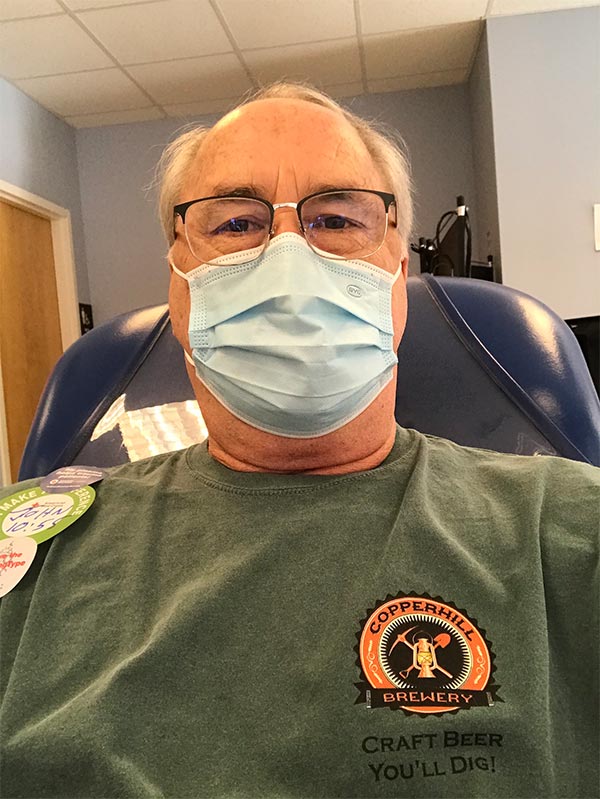
It was only a matter of time. In December one of our own, John Owen, contracted COVID-19 and spent two weeks off of work fighting it. Thankfully he recovered and has not experienced any of devastating or long-term side effects.
Troubled by the lack or therapeutics available to COVID patients John jumped at the chance to help one of the most vulnerable communities. As soon as he was able, he donated his plasma that now contains the antibodies that can help those who are critically ill have a better chance at recovery.
John said this about his plasma donation:
“I’ve done it once and found out that I can continue to donate plasma every seven days until my annual limit. One small needle prick and an hour in a recliner is nothing compared to the chance that my donations can help critically ill patients have a fighting chance at recovery. This disease is no joke, and I am so thankful that my wife and family have so far been spared.”
Some photos John took during the donation procedure and of his "badge of honor" stickers.
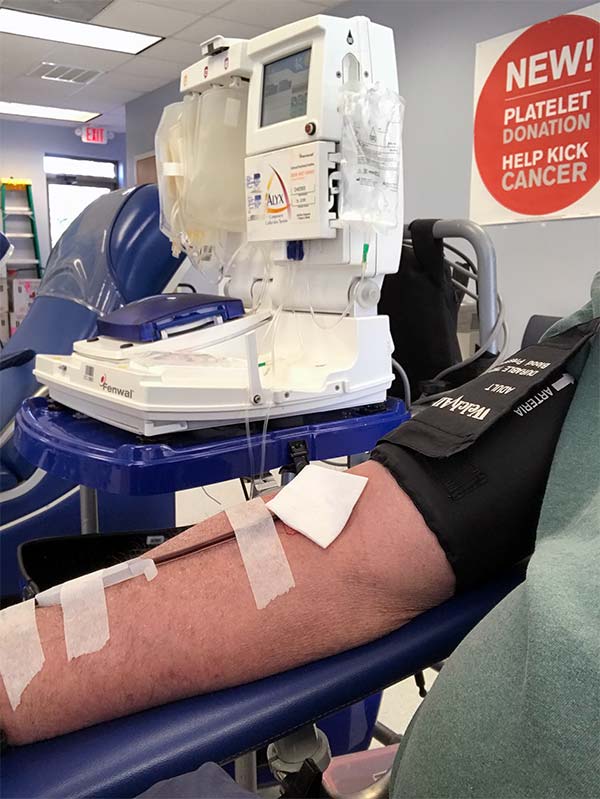
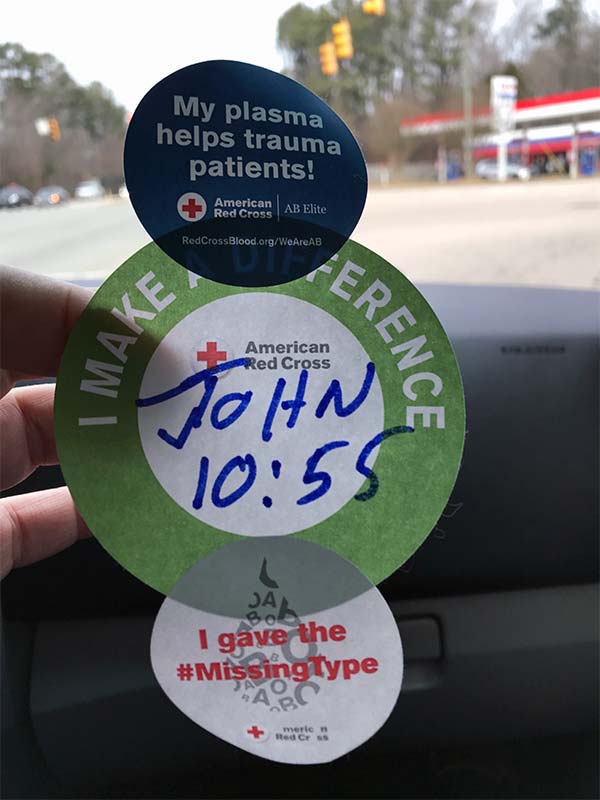
-
Downtime Update

What a week!...and it’s only Tuesday.
As I’m sure all of you know, one of our servers decided that 2020 was just too much for it and bit the dust on Monday morning. Our 7.7 customers dodged the worst of it--we’ve been moving everyone to newer servers as they migrate to the new version--and have seen little disruption. Unfortunately, the rest of you have had significant downtime, and we apologize.
We attempted to resuscitate the server without success. At that point, our disaster recovery procedures went into effect: backups were recovered and our valiant IT and Dev team spent the rest of the day and night porting them to a new cloud server and getting everything rebuilt. Since then, we’ve been working with everyone to get VPNs pointing to the new server location, correcting settings to restore printing and reports, and doing a whole lot of troubleshooting. (All while Nancy is also running an Administrators Training.)
Up next: finish getting all the WebOPACs and WebOrder systems back online and functioning normally.
So, while we know this process hasn’t gone as quickly as hoped, please be assured that we are doing everything we can to get you back in business ASAP. Thank you all for your patience and assistance!
-
Duplication on Demand: What works best for you?
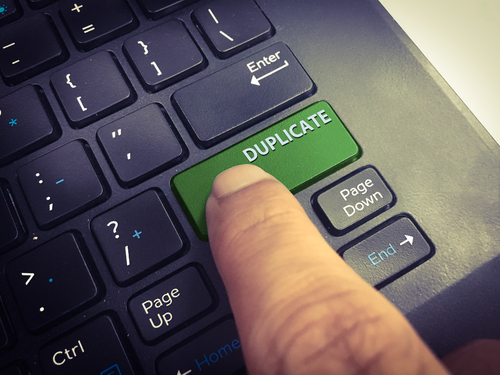
Many KLAS libraries are already wrestling with (or soon will be) the challenges of reduced space to house their collections and / or less circulation and support staff. With these issues and other in mind, we designed KLAS' Patron Centric Cartridge functionality to provide library staff with the ability to quickly select and reproduce a specific set of books onto a cartridge for a specific patron.
While this works well for many libraries, we know this is not the best option for ALL organizations.
In our discussions at Keystone, we have identified at least three different duplication on-demand workflow scenarios including two patron-centric and one title-centric:
- A single cartridge tied to a single patron which is reloaded with books for that patron each time it is returned.
- Cartridges that are loaded with titles based on a single patron's preferences but are not tied to one in particular. Rather, whichever cartridge is available at the time is loaded with the patron's books.
- Cartridges loaded according to inventory (Examples: The Harry Potter Series, Nonfiction titles added in the last 30 days, 1 year of Southern Living)
Some questions we have as we prepare to move forward with providing additional duplication-on-demand functionality within KLAS are:
- Do any of these options appeal to your organization and how it operates more than another?
- What considerations do you think need to be made for each?
- What specific challenges and / or benefits do you think you may see from operating under each?
Please share your answers / thoughts / feedback on the "Duplication on Demand: What works best for you?" klausers.com discussion forum thread.
-
Duplication Supplies
Interested in moving to a Duplication on Demand service model, but not sure how you’ll get enough cartridges and other supplies? There’s help available! NLS is offering supplies to all network libraries that are willing to transition to zero copy allotment--whether they plan to implement Gutenberg or Scribe.
Many of you have already heard about this and some have already put in their request, but please read on anyway—we’ve worked with NLS to make sure we’re accurately covering all the important details.
On top of that, we’ve developed a worksheet to help you plan your implementation process, including when you will need additional supplies.
Just the Facts
When you are ready, you can order from NLS:
- Up to half of your total need for cartridges and containers.
(Total need is calculated based on 5 cartridges per active audio patron, so half works out to 2.5 cartridges and cases per active patron.)
- Pre-printed cartridge and container labels with your library information
In return, you will need to work towards full duplication service. NLS expects libraries to zero out their copy allotment within 12 months of implementing duplication on demand.Good Stuff to Know
Be aware that your supplies will arrive in one shipment on pallets. This is intended to be a lifetime supply, so please be prepared for a large shipment proportional to your patron base.
The cartridges will have the standard “white cartridge” passphrase, and will need to be reset to the peach passphrase using the NLS device, or using the Repurpose mode of the Gutenberg.
NLS encourages libraries to repurpose cartridges and containers from their existing collections to make up the other half of their need, and they can loan Scribe libraries a stand-alone device that will unlock white cartridges for re-use. The cartridge is then re-locked with the peach passphrase, so it will continue to be protected. (Check out our Thursday Tip on High-Capacity Cartridges for the trick to easily identify the best cartridges to keep for duplication.)
Timelines
NLS can only get so many supplies ordered and distributed per month. Currently, they are asking for two month’s lead time.
Being clear about your timeline and need will help NLS prioritize orders, as will holding off on requesting supplies if they will not be needed soon. NLS will also ask Keystone to confirm that we have an “authorized commitment” to proceed and a clear implementation schedule in place, so please coordinate with us before you make your request for duplication supplies to NLS.
To help you estimate when supplies will be needed, and in what amounts, we have developed the attached worksheet. Take advantage of our experience with several implementations, and have a look! Of course, we know you may still have questions or need more help making your estimates, so don’t hesitate to get in touch with us for assistance.
Worksheet
The attached questionnaire is intended to help guide you through planning your implementation of a Duplication service model using Scribe or Gutenberg, including generating estimates of supplies needed for the initial stages, specific goals, and action items.
It will be most useful before contacting NLS to order supplies.
- Duplication Questionnaire - Word
- Duplication Questionnaire - PDF
-
Exciting News! Scribe to unlock NLS cartridges
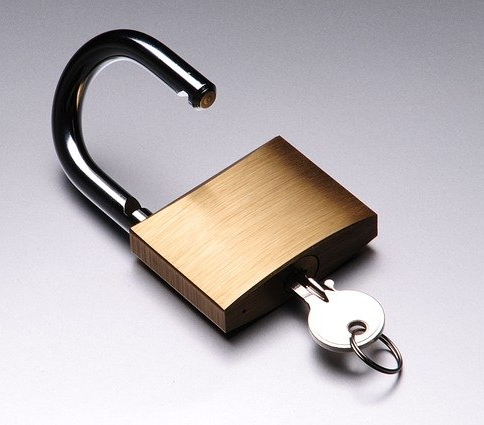
Keystone is excited to announce that we've signed an agreement with the National Library Service for the Blind and Print Disabled (NLS) to allow our Scribe Duplication on Demand system to unlock the white, pre-loaded NLS cartridges for repurposing.
Our developers have already begun working on adding this feature to KLAS and expect the initial release of this new functionality to be in the next month.
We plan for the unlock process to be very simple. When you plug a cartridge in to the Scribe to duplicate onto it, the Scribe will check to see if the cartridge needs to be processed. If the cartridge is one the system hasn't seen before, it will process it, ensure we can unlock it, and then follow the NLS guidelines setting the passphrase to be consistent across the network for all repurposed NLS cartridges.
For any cartridges that can't be processed as part of duplication, there will also be a separate mode which allows staff greater control, ensuring all cartridges can be processed and unlocked.
We know this functionality is something our current and future Scribe libraries have been hoping for, and we're thrilled to now be able to bring it to you! Be on the lookout for a Weekly Wrap-up in the near future which will detail exactly which KLAS release includes the capability for Scribe to unlock ALL NLS cartridges.
Please be sure to let customer support know if you have any questions about the timeline or implementation process.
-
Future IRC User Relevant Events
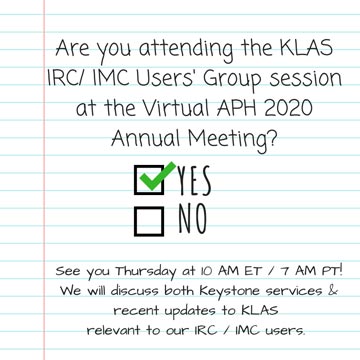
Today's KeyNotes blog post is all about upcoming IRC / IMC KLAS user-relevant events, including:
- IRC KLAS Administrator Online Training
- KLAS IRC / IMC Users' Group Session at the virtual APH 2020 Annual Meeting
- 10/22/2020 KLAS IRC Users' Roundtable
2021 KLAS Users' Conference
Read on for more details about each of these...IRC KLAS Administrator Online Training
In September, we conducted our first online KLAS Administrator's Training session. Next week's blog post will share details and feedback about how it went. Before that, however, I want to share the news that we are planning to offer it again and want our next session to be IRC focused. The thing is... we need your help to figure out when to schedule it so it works best for those attending.
The training is held over the course of a week, Monday through Thursday, with two sessions each afternoon (to allow participants to join from any time zone), and includes pre-class worksheets that we recommend filling out to prepare for each session and a printed Administrator's Reference manual which will be mailed to you. This training is limited to attendees who have a KLAS Administrator role, including the authority to change records and policies for their KLAS system. If you fit this description and wish to participate, please complete this short survey to help us determine the best time to offer it.
Administrator training costs $600 per attendee, but the online format means that there is no longer any need for additional travel costs.
KLAS IRC / IMC Users' Group at APH 2020 Annual Meeting
We hope all IRC / IMC staff who registered for the virtual APH 2020 Annual Meeting plan to join us for the KLAS IRC / IMC Users' Meeting at 10 AM ET / 7 AM PT on Thursday, October 8. This year's session is limited to one hour because of the compressed conference schedule, so our plan is to:
- present some highlights of what we've added to KLAS for IRCs, and what's coming next
- share some news about upcoming IRC focused training
- have a bit of time for Q&A
10/22/2020 KLAS IRC Users' Roundtable
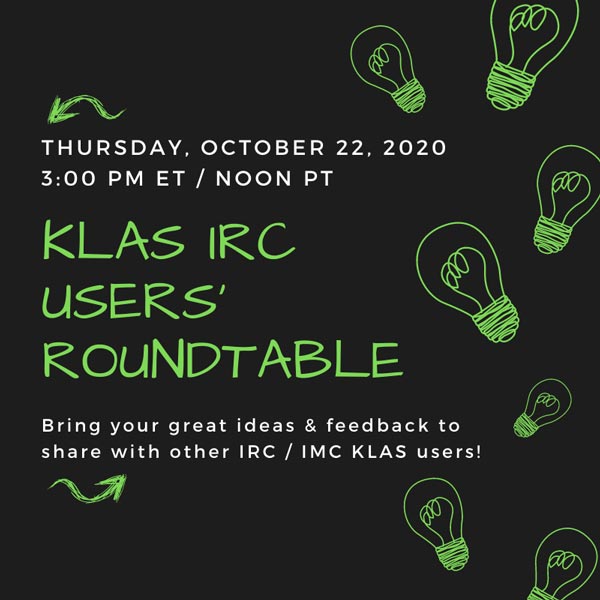 Additionally, knowing the limited time we will have during the APH Conference, the KLAS Program Committee decided our next KLAS IRC Users' Roundtable will be held Thursday, October 22 at 3 PM ET / Noon PT. We're excited to announce that Jared Leslie, AZ IRC, will be moderating the session. We hope it will be an opportunity to continue the discussion on any topics we don't have time to fully address during the APH meeting, provide more time for users to share feedback and tips and tricks, and an additional opportunity to demo new features and functionality.
Additionally, knowing the limited time we will have during the APH Conference, the KLAS Program Committee decided our next KLAS IRC Users' Roundtable will be held Thursday, October 22 at 3 PM ET / Noon PT. We're excited to announce that Jared Leslie, AZ IRC, will be moderating the session. We hope it will be an opportunity to continue the discussion on any topics we don't have time to fully address during the APH meeting, provide more time for users to share feedback and tips and tricks, and an additional opportunity to demo new features and functionality.- Log-in information will be posted to the KLASUsers e-list and in the "Upcoming Webinars & Roundtables" article approximately one week prior to the roundtable.
2021 KLAS Users' Conference
Finally, we want to remind you that we're are in the process of planning an in-person 2021 KLAS Users' Conference (with the knowledge that we need to be willing to adapt and change depending on the state of COVID-19). At this time, the plan is for it to be held at Tennessee School for the Blind in Nashville from June 29-July 1, 2021. This will be our first biennial conference AND the first hosted by an Instructional Resource Center. Accommodations information will be available in the near future.
We sincerely thank Dr. Kathy Segers, Director of Accessible Instructional Materials and Outreach Services, Tennessee School for the Blind for being willing to host for 2021 KLAS Users' Conference. We look forward to working with you to plan an informative, inspirational, and rewarding experience for all our attendees. The Program and Logistics Committees are already actively meeting with the goal of bringing you a well-planned conference offering opportunities for sharing great ideas and learning new ways to use KLAS to help improve the services your organization provides.
-
FYI for NLS Libraries - FY2020 Statistics

NLS has requested that we (and the other NLS providers) extract and submit some data for them to review. For each of our NLS Libraries, we will be providing NLS with the following statistical information on October 1.
We will be generating these data files for NLS and submitting the information to NLS directly, so you don't need to do anything. We will also send a copy to each library, so you know what was sent to NLS and can review the data for your own information.
Readership: a list of all patrons that received materials from the library during Fiscal Year 2020. The list will include the Patron PIMMS ID, whether they are marked Individual or Institution, and whether they received at least one of the following during FY 2020:
- Digital Audio book
- Hard Copy Braille book
- E-Braille brook
- or Network Library collection item
Note that audio and hard copy braille readership activity includes both books circulated by the library and magazine subscriptions sent by NLS. Network library collections include large print books, descriptive videos, and local magazines. BARD download activity is not included, as NLS already has that information.
Circulation: a count of all circulations this year broken out by library and by medium: Talking Books on Cartridge; Hard Copy Braille; and E-Braille on Cartridge. Circulation counts include counts for book/monograph circulation only. Local magazines/serials sent on cartridge are not part of these counts.
Note that Audio circulations are a count of the number of titles sent on cartridge instead of the number of cartridges sent. Hard copy braille circulations count the number of volumes sent, e-braille is the number of titles sent.
A note about the Readership & Circulation Report: Be aware that the number of people in the Readership list we provide to NLS probably will not match the total from your Readership & Circulation report. The R&C report total includes all accounts that you have updated that year, even if they did not receive something. With that in mind, if you have questions about how these lists do and do not line up with your R&C report, please let us know.
-
Getting Smart about Series

This is a guest post by Sam Lundberg - Reader Advisor for the New Mexico State Library for the Blind & Print Disabled, and current President of the KLAS Development Advisory Committee.
We’ve had a lot of interest recently from across the community for Nightly AutoSelect to be more “series smart,” and not send book 3 in a series before a patron has had book 1. I’m among the chorus that’s been asking for this since the beginning of DoD, but I think it is worth talking about exactly how we want this to work. There are a lot of different ways that Nightly could be series smart, each with a different impact on the patron experience.
I’m going to lay out a few of the ways that I’ve thought of, along with advantages and possible drawbacks. I’d love to hear what others have been thinking on this subject, and I’m sure Keystone would appreciate knowing exactly what we want, rather than a vague mission to make it better.
As a preface, I have no idea how practical any of these solutions are from a programming side. I’ve tried to lay out specific rules that an algorithm could follow, but that doesn’t mean they would be easy, or even possible, to put in place. Some of these rules may also bog Nightly down to a crawl, requiring more time to run each night. This is a thought exercise to figure out exactly what we, as a community, want, rather than a menu of actual possibilities.
Option 1
1a) “First in the series only”
- When Nightly picks a title by Subject, it checks the “series sequence” field and excludes any book with a value greater than 1.
This is basically what is accomplished by libraries that use a “Sequel” subject code. Autoselect wouldn’t send out any sequels, which would exclude a large number of books from popular authors who write primarily or exclusively series. For context, I just ran a query and found that 321 of the 564 mystery titles we’ve added this year have a series sequence between 2 and 999.
Since this would be based on a Nightly setting, it would be library-wide rather than patron by patron. However, if KLAS also adds the ability to customize Nightly Functions by Serve Code, you could create an “AutoSelect No Sequels” serve code and an “AutoSelect All” serve code and select the appropriate one for each patron.
1b) “First or next in series only”
- When Nightly picks a title by Subject, it checks the “series sequence” field and excludes any book with a value greater than 1 UNLESS the patron has a “HasHad” for the previous book in the series..
Like 1a, except that subsequent books in a series can be sent if the patron is caught up in that series. This would help increase the available possible selections for series-heavy genres like Mystery. However, there is no mechanism for a patron to catch up on a series once they have missed a book, or for new patrons to get started on a long-standing series, without a specific request or Series preference.
Option 2
2a) “Not this book, but this series”
- When Nightly picks a title by Subject, it checks the “series” field and instead sends out the earliest book in that series not marked as “Has Had”.
The idea here is that, instead of sending out book 7 in a series, Nightly would go back and send out book 1 (or book 5 if the patron had the first four books already). This method would ensure that patrons are still able to access series books, but will always do so in order.
However, because the book Nightly initially found isn’t being sent out, there is no “Has Had” record added to that title, so Nightly will keep finding that book and sending books from that series over and over and over. How much of a problem this is will be very contextually dependent. If you use “Latest First” service for Subject, the books Nightly finds will change constantly.
But if you use “Earliest First” and don’t update your KLAS ID Ranges often, then nightly will check the same books every time. For instance, if your KLAS ID range starts at DB090000, Nightly will find Joanne Fluke and Stuart Woods at 90001 & 90002 respectively, so patrons with a mystery Subject preference would receive those entire series in rapid succession under this scheme. And given the prevalence of this sort of long-standing series, patrons may receive a large number of older titles as they are bumped back 20, 30, 50 books in a series.
2b) “Not this book, but where I left off this series”
- When nightly picks a title by Subject, it checks the “Series” field, locates the item with the highest series sequence in that series with a “Has Had” record, and sends the next book.
2a would fill in gaps if a patron skipped books or started with book 15. 2b wouldn’t fill in gaps, but would select the next book after the highest numbered book the patron has read.
For example, if a patron has read books 1, 2, 4, and 8 in a series and Nightly wants to send them book 10, 2a would instead send book 3, while 2b would send out book 9.
Option 3
3a) “Not this book, but this series, but not too often”
- When Nightly picks a title by Subject, it checks the “series” field and instead sends out the earliest book in this series not marked as “Has Had” UNLESS a book in this series is already in the Service Queue or a pending order, in which case Nightly will skip this title and series.
See Option 2, except that the frequency of a series being sent is gated by the length of the service queue, rather than the frequency the queue is refilled. If the patron’s service queue is 30 books long, you know there will be at least 30 books between each book in a series. However, this makes more sense for long running series than for short trilogies. I could see wanting to have different behaviors based on the length of the series, but that is getting complicated to keep track of. Keep in mind, this only applies to Subject and possibly Author. Books selected by Series, Request or Reserve would not have this same gating.
3b) “Not this book, but this series, but not too often, and picking up where I left off”
- When nightly picks a title by Subject, it checks the “Series” field and instead sends out the next book after the highest number book in the series marked as “Has Had”, or book 1 if the patron has not read any books in the series. UNLESS a book in this series is already in the service queue or a pending order, in which case nightly will skip this title and series.
Like 2b, this option just differentiates between filling in the gaps in a series or continuing from the highest numbered book a patron has read.
Option 4
4) “This book and this entire series”
- When nightly picks a title by Subject, it checks the “Series” field and queues all unread books in that series.
This could work well for shorter series, especially trilogies with a tight story, but would create a very hit-or-miss situation when dumping an entire 20+ book series. As with 2b, I worry that having a cutoff point for different behaviors would create confusion and unexpected outcomes. I think it would be possible to catalog our way out of this problem, flagging series as either a tight story or as episodic/procedural, but that isn’t something every library, including NM, could commit to. This rule would also need to differentiate between sequence 0 books (which are often more a collection and less a series) and numbered series.
Practically, I don’t think this could work as the default option given the sheer quantity of long-running series, but I could see this as an alternative that specific patrons would want to opt-in to.
Option 5
5) “Just care about what is in the Queue now”
- When Nightly picks a title by Subject, it checks the Service Queue for any books in the same Series. If another book in the queue is in the same Series and has a higher Series Sequence, the new book is placed ahead of the book already in the queue, rather than at the end.
Basically, if Nightly is trying to add book 2, and book 3 is already in the queue, book 2 is slotted just ahead of book 3, rather than at the end of the queue. This would only address the issue of patrons being sent books out of order in immediate proximity, such as when several books in a series are added at once by the NLS. Limited potential help but also limited potential harm.
So what option (listed above or something else entirely) would you want?
A big consideration is do we want this to be patron-by-patron? Or do we want it to be library-wide? And what do we want to be the default behavior vs. the opt-in behavior? Should this apply only to Subject selections, or Author as well?
Personally, I’m in favor of option 3b “Not this book, but this series, but not too often”. I think it addresses the core problem of books being sent out of order while avoiding any big drawbacks. It isn’t perfect, and will be clunky for short series, but that’s what Author Preferences and Reader Advisors are for. That said, I’m sure there are all sorts of circumstances I’m not accounting for that should be considered.
What are your thoughts? How, exactly, do you want Nightly to be series smart?
-
Guiding Us Forward

Our developers have been very busy lately, implementing Gutenberg, ironing out eCommerce, and gearing up to start converting IRC / IMC customers to version 7.7, among other things.
But amidst all of that, we’re still listening for your feedback—and even relying on it more than ever!
So here are a few notes on how you are helping guide us forward.
1. KDAC (KLAS Development Advisory Committee
KDAC has some new members! A big welcome to Sam Lundberg of New Mexico Talking Book Library and Shawn Lemieux of New York State Talking Book & Braille Library, and thank you so much for lending us some of your time!
So, what goes on in a KDAC meeting? We spend a lot of the timesharing what we’ve been working on that month (making your KDAC representatives a great source of “insider information” about what we’ve been up to), as well as our plans and expectations about what’s coming up next. Through all of that, we’re listening to their feedback and taking notes about what they think of new features, what questions they think need to be addressed, and their suggestions on prioritization.
We also frequently have questions for them: should we pursue Option A or Option B to fix a specific issue? How can we make this or that easier? If we did things this way, would that cause any problems for you?
KDAC has been a big help in steering and refining our development, so I’m especially excited to find out what the new voices will bring to the table this year.
(Want to learn more about KDAC, view a list of all current members, or review the new guidelines? It’s all in the KDAC Article.)
2. Webinars & Other Non-Conference Stuff
I’ve been happy to do several Q&A webinars with the Users’ Group, and we’ve had a lot of positive feedback (thank you all so much!)... but I don’t want mine to be the only voice you hear.
Are there topics you want to hear about, or something you’d like to share? Whether it’s a new initiative at your library, your experiences implementing Duplication on Demand, or a discussion focused on a specific area of KLAS (like Serials or Accounts), we want to hear your topic ideas!
If you’d rather collaborate with another user or a Keystone expert, don’t hesitate to suggest it anyway; we’d be happy to help out or help you find someone who can.
A very easy way to weigh in on all this is to fill out the 2019 KLAS Users' Conference Follow-up Survey! Yes, even if you didn’t attend the 2019 conference!
If you’ve completed the survey and think of something new, or something that didn’t fit in the form, you are also very welcome to email us at Keystone or any of your Users’ Group officers, or you can post about it on the Discussion Forums.
However you go about it, thank you for helping guide us and making KLAS and your Users’ Group better and better!
Page 3 of 10

